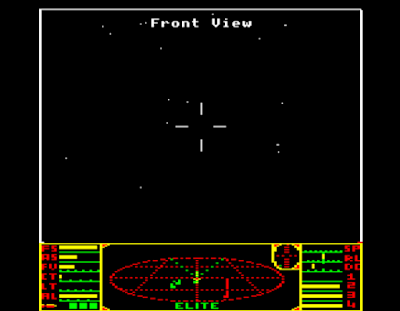You know how I keep banging on about games set in space? Well here's a game set in space. Not just any old game set in space, but perhaps the game set in space, the one every other game wants to be. It is simply Elite and I've been waiting for a chance to dive into it for a while.
I don't know where I came across Elite itself, though the video from Computerphile above may lay claim to having told me the most about it. Before that - way before that - I remember playing a pencil and paper RPG where we built our own ship that was inevitably badly constructed, requiring a merciful GM to fudge the die rolls as and when. I assume this game - whatever it was and wherever it came from - was inspired by Elite, itself inspired by classic science fiction stories and films.
Finally, along comes a game about climbing into a ship and hoofing it across the galaxy however you see fit, and it was first released on the BBC Micro, which meant finding an emulator.
Frustrations
Finding an emulator was fairly easy, and there are a few of them around, even allowing you to play in a web browser, but I opted for the recommended BeebEm which comes complete with sound effects to indicate and emulate the loading times reading from an imaginary cassette tape. The only thing missing are some shaders and filters, which it probably includes, if I looked hard enough. Still, I fired up Elite but was sat at the title screen for an awful long time.
After the restart, my settings were good, BeebEm was emulating the right hardware, this second copy of Elite actually ran beyond the title screen... I was ready to get my game on and begin jetting across the galaxy on missions of my own making. Where are we going? I don't know! It's procedurally generated random number fun, and we could end up anywhere!
I ended up smashing into the space station I began the game in!
Elite is... well, some might say fiddly, others outright difficult. Elite is a simulator, and it doesn't mess about. You'll be pressing buttons one by one, to varying degrees, just to see what they do and how much they do it. Rolling on the spot is an easy one to learn, using the < and > keys. Pitching up and down comes afterwards, where you (read: I) always forget that S is down and X is up. You'll hit the Space bar a few times to increase your speed, then panic looking for the / key to decrease it.
It's when you eventually find the map button, and then the keys to jump to another star system, that Elite really takes off.
Fun Times
There are eight galaxies with 256 planets each for you to explore. It makes every other game of the day look small and insignificant, until you learn that that feat of coding is really just a case of reading entries off a table as and when required. Elite doesn't cram an entire universe in 32k of memory, it can't, so it's smart about how the galaxy and its many star systems are presented to you. Ask for further info on a planet and you'll get further info. Don't, and you'll be left to your own devices to drift through space or chart the galaxy as you see fit.
From my initial starting point of Lave, I journeyed towards Reorte, where I found my speakers going nuts.
It doesn't look like much, but my radar gave the game away, once I remembered to look at it. There were ships, I presume, all around me, and it sounds like they were firing missiles at me. I had hyper jumped into the middle of someone's turf and they didn't like it at all.
While my weedy little lasers took one of the ships out - hopefully an enemy of some kind, as oppose to a civilian ship in distress - my lack of skill was my undoing and another Game Over soon followed.
Further Frustrations
I remember reading an article about The Elder Scrolls IV: Oblivion as it was making its way to the PS3, and it mentioned how random events would occur as you wandered around the place from time to time. I, being easily pleased, was in awe at such a feature, oblivious to its existence in other games before it, including Elite and it's bigger and much improved sequels.
You simply don't know what you're going to get out of a game of Elite. I assume you can aim for something, but your end goal is of your own making. I've barely tickled the surface, let alone scratched it. The manual shows how incredibly unprepared I am for space travel, with its combat and trading mechanics scattered all over the keyboard. Dedication might as well be essential, because diving into Elite for a quick game isn't really the done thing.
That's frustrating because I kinda want to explore the hell out of a galaxy, but I just don't want to have to navigate my way through a flight simulator before I get there. When No Man's Sky releases, you can bet your bottom dollar I'll be hopping into my ship and diving right in, but if the controls are off putting, can all kinds of fancy graphics or underlying systems save the game?
Final Word
In the case of Elite, you can probably say yes, fancy graphics and underlying systems save the game. Elite is unlike the vast majority of games on this list so far, with the only exception that leaps to mind being Star Wars. There though, you're flying an X-Wing with the purpose of destroying TIE Fighters and taking down the Death Star. In Elite, the pace is far from frantic unless you want it to be, or have stumbled into a situation that demands urgency on your part.
You can go to space and not shoot things though. Isn't that novel?
You can go to space and not shoot things though. Isn't that novel?
For me, the learning curve here was steep. I could move and shoot and drift my way through, but I was nowhere near what you'd call 'in control' of my ship. I was a passenger reacting to whatever my clumsy piloting lead me towards, rarely moving in two axis at once. It makes me wish I had the complete Elite box in front of me, with its novella, The Dark Wheel, to give you an idea of the setting and how various game concepts work, as well as an all import flight training manual to give you more of an education and introduction to controlling the game, compared to my Googling...
Elite is without question a must play, if only to better understand where the likes of Elite: Dangerous, Star Citizen and No Man's Sky came from. I may never get to carve out my own little corner of space, trading between a handful of planets so that I can retire young and live out the rest of my days not being shot at by space pirates, but that doesn't stop me from dreaming about it. In time, I might find some skill, somewhere, and enough time to really dig into Elite. Until then, I'll have to rest assured that space is always out there, waiting.
Fun Facts
Procedural generation has its moments, and an entire galaxy had to be removed because the seed would have lead to a single planet being named 'Arse'. I wonder how No Man's Sky is going to cope... Speaking of, where Elite could give you 2048 planets, No Man's Sky includes over 18,000,000,000,000,000,000. Of course, 'includes' is the wrong word - Blu-ray Discs are big, but still...
Elite, developed by David Braben and Ian Bell, first released in 1984.
Version played: BBC Micro, 1984, via emulation.








